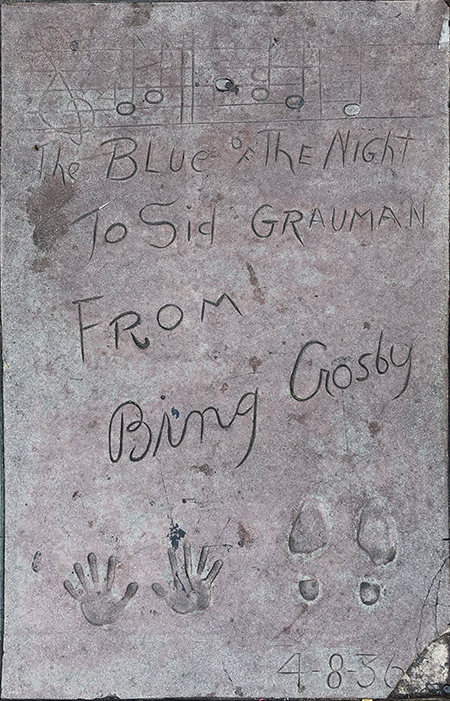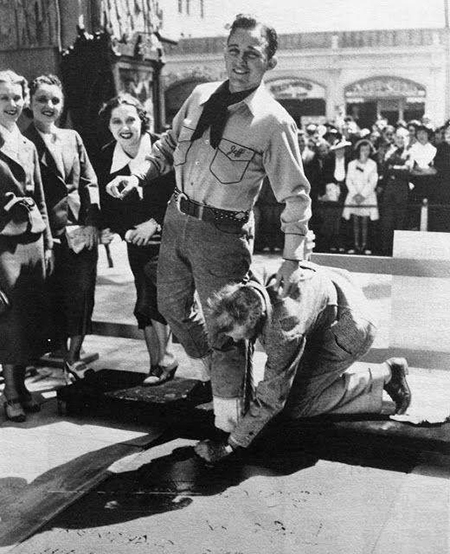 |
 |
|
|
| Bing Crosby |
 |
| Forecourt Ceremony held on Wednesday, April 8, 1936 |
| |
Born: Harry Lillis Crosby, Jr., May 3, 1903, in Tacoma, Washington
Age at the time of the ceremony: 32
Died: October 14, 1977, in Alcobendas, Spain, age 74 |
| |
Bing Crosby was a singer who defined the generation before, during and after World War II. With an unmistakable voice, easy-going manner and commanding screen presence, Crosby became a huuuge success at everything he touched, whether it be radio, recordings, films, television or racehorses.
The fourth of seven children, Crosby grew up in Spokane Washington, acquiring his nickname "Bing" by age seven. In 1917, Bing got a summer job as a property man at the local vaudeville house, where he was "electrified" by a personal appearance by Al Jolson. Young Bing knew what he wanted to do in life: be a singer. He enrolled at Gonzaga University and played baseball there, but did not graduate.
Bing had teamed up with Al Rinker, and began singing between films at the Clemmer Theatre, an early film house in Spokane. By 1925, the pair lit out for Hollywood. Rinker's sister Mildred Bailey got them an audition with Fanchon & Marco, who sent them out on their circuit in "The Syncopation Idea" for $75 a week. In 1926, Bing and Al had been hired to play the Tivoli Theatre in Chicago by jazz bandleader Paul Whiteman. They began to make recordings. Next stop — the Big Time!
Not so fast, buddy. Whiteman added a third man, a pianist named Harry Barris and they toured as "The Rhythm Boys," playing with every leading name in the world of "white" jazz. The Rhythm Boys appeared in Whiteman's musical film King of Jazz (released in April 1929), and Crosby's vocal on Whiteman's jazz cover of "Ol' Man River" went number one. The Rhythm Boys went to work for Gus Arnheim orchestra at the Ambassador Hotel in Los Angeles, but the pay was low; they connected with Bill Paley at CBS, and in 1931, Crosby was appearing onstage at the New York Paramount, and singing on the CBS radio network.
He made his film debut in Paramount's The Big Broadcast (released in October 1932), where he introduced what would become his theme song for a while: "Where the Blue of the Night (Meets the Gold of the Day)". A large number if films followed, with all of them hits. In 1934, Crosby signed a deal to record exclusively for Decca Records.
When Crosby was asked to make his mark at the Chinese in 1936, the ever-promoting Bing wrote out the first line of his theme song: "Where the Blue of the Night (Meets the Gold of the Day)" which would become the theme song of his new show on NBC — the Kraft Music Hall, where he would remain until 1946.
Crosby bolted to Columbia to make Pennies from Heaven with his idol Louis Armstrong (released in November in 1936) — Crosby insisted that Armstrong's name be up there with his and Madge Evans', possibly the first time that had happened.
Crosby is famous for his films with Bob Hope, the "Road" pictures: Road to Singapore (released in March 1940), Road to Zanzibar (released in April 1941), and Road to Morocco (released in November 1942). He sang "White Christmas" in the film Holiday Inn (released in September 1941). Crosby's signature performance is in Leo McCarey's Going My Way (released in October 1944) and for which, Bing would receive his Oscar for Best Actor on stage at the Chinese on Thusday, March 15, 1945).
During World War II, Crosby went on the USO circuit between pictures, performing before troups in the European Theatre. Crosby could sort-of speak German, so he was asked to read announcements over the radio to German soldiers, who nicknamed him "Der Bingle." He was voted the leading booster of troupe morale during the war. By 1945, Life magazine reported that Bing had sold more than 60 million records. His recording of Irving Berlin's "White Christmas" has sold over 50 million copies — so far.
Very busy in pictures during the 1950s, Crosby enjoyed major successes in White Christmas (released in October 1954), The Country Girl (released in May 1954), and High Society (released in July 1956). He is considered the third highest-grossing star career-wide, right behind Clark Gable and John Wayne.
Crosby was active in television. He made a number of guest appearances on various programs, and produced Christmas Specials several times. He set up a production company, which produced Ben Casey (1961-1966) and the popular Hogan's Heroes (1965-1971). He and associates owned several television stations. From 1935, Crosby was a founding partner of the Del Mar Racetrack in Del Mar California.
Crosby died of a massive heart attack after playing a round of golf outside of Madrid Spain. He was 74. |
|
|
|
|
| |
 |
 |
| Grauman's Chinese Theatre, Hollywood, California. Bing Crosby Forecourt block. Executed by Jean Klossner, Wednesday, April 8, 1936. 43 x 67 inches. |
 |
 |
 |
| Grauman's Chinese Theatre, Hollywood, California. Bing Crosby Forecourt ceremony, Wednesday, April 8, 1936. Bing Crosby is assisted in making his footprints by cement artist Jean Klossner. |
|
|